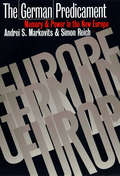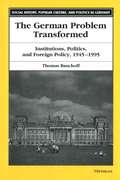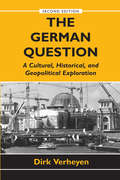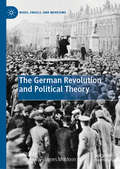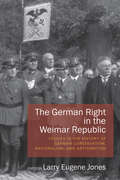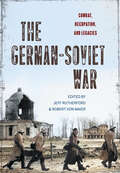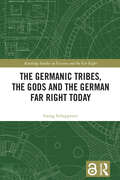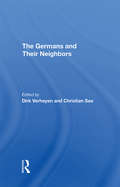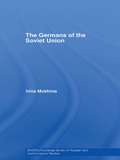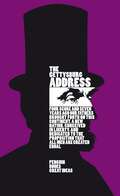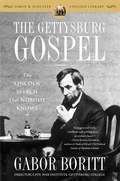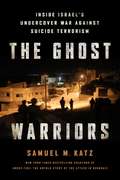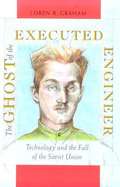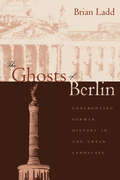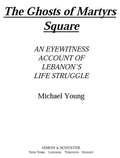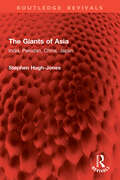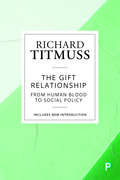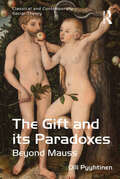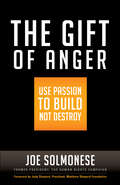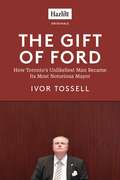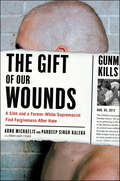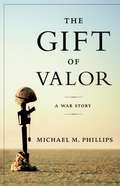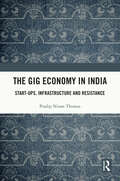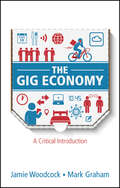- Table View
- List View
The German Predicament: Memory and Power in the New Europe
by Andrei S. Markovits Simon ReichWhat does the unification of Germany really mean? In their stimulating exploration of that question, Andrei S. Markovits and Simon Reich sketch diametrically different interpretations than are frequently offered by commentators. One is that Germany, well aware of the Holocaust, has been 'Europeanized' and is now prepared to serve as the capitalist and democratic locomotive that powers Europe. The other is that the proclivities behind Auschwitz have been suppressed rather than obliterated from the German psyche. Germany's liberal democracy was imposed by the allied victors, according to this view, and will one day dissolve, revealing the old expansionist tendencies to try to 'Germanize' all of Europe.Markovits and Reich argue that benign contemporary assessments of Germany's postwar democracy, combined with admiration for the country's economic achievements, contribute to German influence far greater than military might was able to achieve. Yet, at the same time, some Germans have internalized liberal and pacifist principles and now see their nation as powerless, simply a larger Switzerland. As a result, while the Germans have enormous influence and latitude, they have not taken responsibility for leadership. The prime reason for this gap beween ideology and structure, Markovits and Reich suggest, lies in the politics of collective memory.
The German Problem Transformed: Institutions, Politics, and Foreign Policy, 1945-1995
by Thomas BanchoffDoes the new, more powerful Germany pose a threat to its neighbors? Does the new German Problem resemble the old? The German Problem Transformed addresses these questions fifty years after the founding of the Federal Republic and ten years after the fall of the Berlin Wall. Many observers have underscored the reemergence of Germany as Europe's central power. After four decades of division, they contend, Germany is once again fully sovereign; without the strictures of bipolarity, its leaders are free to define and pursue national interests in East and West. From this perspective, the reunified Germany faces challenges not unlike those of its unified predecessor a century earlier. The German Problem Transformed rejects this formulation. Thomas Banchoff acknowledges post-reunification challenges, but argues that postwar changes, not prewar analogies, best illuminate them. The book explains the transformation of German foreign policy through a structured analysis of four critical postwar junctures: the cold war of the 1950s, the détente of the 1960s and 1970s, the new cold war of the early 1980s, and the post-cold war 1990s. Each chapter examines the interaction of four factors--international structure and institutions, foreign policy ideas, and domestic politics--in driving the direction of German foreign policy at a key turning point.
The German Question: A Cultural, Historical, And Geopolitical Exploration
by Dirk VerheyenThe 'German Question,' long a subject of debate, is considered here at the close of a turbulent century, after Germany's defeat in two world wars, the Weimar failure and Nazi disaster, Cold War division, and the nation's unexpected recent reunification. This book systematically explores the issue in terms of its four central dimensions: Germany's identity, national unity, power, and role in world politics. Ambitious in conception and meticulous in execution, Dirk Verheyen's wide-ranging analysis incorporates historical and geopolitical considerations in an intellectually rigorous yet accessible discussion.
The German Revolution and Political Theory (Marx, Engels, and Marxisms)
by James Muldoon Gaard KetsThis book is the first collection within political theory to examine the ideas and debates of the German Revolution of 1918/19. It discusses the political theorists and actors of the revolution and uncovers an incredibly fertile body of political thought. Revolutionary events led to the proliferation of new political strategies, theoretical insights and institutional proposals. Key questions included the debate between a national assembly and a council system, the socialisation of the economy, the development of new forms of political representation and the proper role of parliaments, political parties and trade unions. This book offers novel perspectives on the history of the revolution, a thorough engagement with its main thinkers and an analysis of its relevance for contemporary political thought.
The German Right in the Weimar Republic: Studies in the History of German Conservatism, Nationalism, and Antisemitism
by Larry Eugene JonesSignificant recent research on the German Right between 1918 and 1933 calls into question received narratives of Weimar political history. The German Right in the Weimar Republic examines the role that the German Right played in the destabilization and overthrow of the Weimar Republic, with particular emphasis on the political and organizational history of Rightist groups as well as on the many permutations of right-wing ideology during the period. In particular, antisemitism and the so-called "Jewish Question" played a prominent role in the self-definition and politics of the right-wing groups and ideologies explored by the contributors to this volume.
The German-Soviet War: Combat, Occupation, and Legacies
by Jeff Rutherford Robert Von MaierThe German-Soviet War revises the conflict's generally accepted understanding through case studies, demonstrating the complexity of the war at the local level. The contributors assembled by Jeff Rutherford and Robert von Maier examine the multiplicity of experiences of individuals caught in this savage war, starting with the German war of annihilation launched against Soviet state and society in June 1941. This detailed collection shows that the particular nature of the war in the east resulted from an intertwining of military, ideological, and economic motives. The German-Soviet War puts Germany's murderous policies toward Soviet Jews and prisoners of war, and the justification for these policies and actions within the ranks of the army, into the larger context of battlefield events. The neglected topic of the destructive German scorched-earth retreats receives detailed analysis, demonstrating the importance of ideology and economic thinking in the German army's war. The difficulty in reconciling economic and ideological considerations also played a prominent role in Soviet attempts to rebuild after the war. The German-Soviet War not only brings attention to these devastating events but also revises the general narrative of the war. By internationalizing the conflict through examinations into the various Axis and Allied nations and peoples who participated in the fighting, this volume provides new ways of conceptualizing their motivations, actions, and importance in its eventual outcome. Together, the contributions to The German-Soviet War provide new ways of examining the defining conflict of the Second World War.
The Germanic Tribes, the Gods and the German Far Right Today (Routledge Studies in Fascism and the Far Right)
by Georg SchuppenerThe Germanic Tribes, the Gods and the German Far Right Today deals with the question of how right-wing extremists in German-speaking countries adapt and adopt elements from the history, culture, and mythology of the Germanic tribes. It provides the first in-depth study of the adoption of these historical motifs by right-wing extremists. Using linguistic and historical perspectives, and drawing on both publicly accessible material and sources gathered by the intelligence services, the book delineates the influence and impact of Germanic tribal history and culture within extremist subcultures. The author demonstrates that references to the Germanic peoples, their history, culture, and mythology, are even more widespread among contemporary right-wing extremists than they were in the interwar National Socialist era. This book will be of interest to researchers of right-wing extremism, German politics, and social movements.
The Germans And Their Neighbors
by Dirk Verheyen Christian SoeFor Germany's neighbors, perhaps more acutely than for observers elsewhere, the 1990 reunification of divided Germany has raised old memories and new concerns in public and scholarly discourse. The shape and influence of these issues are the subject of this unique, ambitious book. Organized into country-specific chapters, the book offers original, expert analyses of Germany's relations with seventeen European neighbors as well as with the United States. The contributors explore the essential concerns these nations have faced in their bilateral relations with Germany—past, present, and future. In their introduction, the editors trace both commonality and diversity in various national conceptions of the "German Question" and the ways in which these perceptions in turn generate shared as well as divergent national policy agendas vis-a-vis united Germany.
The Germans of the Soviet Union (BASEES/Routledge Series on Russian and East European Studies #Vol. 32)
by Irina MukhinaThe Germans were a very substantial minority in Russia, and many leading figures, including the Empress Catherine the Great, were German. Using rarely seen archival information, this book provides an account of the experiences of the Germans living in the Soviet Union from the early post-revolution period to the post-Soviet era following the collapse of communism. Setting out the history of this minority group and explaining how they were affected by the Soviet regime’s nationality policies, the book: describes the character of the ethnic Germanic groups, demonstrating their diversity before the execution of the policy of systematic deportations by the Stalinist authorities from 1937 to 1947 argues that there was not one but several episodes of deportation within this period considers the different dimensions of this policy, including the legal and economic structures of, and everyday life in, the Soviet special settlements investigates the ‘women’s dimension’ of deportation, especially the role of women in the preservation of ethnic identity among the afflicted groups explores the long term consequences of Soviet deportations and exile on the identity of the Soviet Germans.
The Gettysburg Address: The Constitution Of The United States Of America, The Declaration Of Independence, Lincoln's Gettysburg Address (Penguin Great Ideas Ser.)
by Abraham LincolnThe Address was delivered at the dedication of the Soldiers' National Cemetery in Gettysburg, Pennsylvania, on the afternoon of Thursday, November 19, 1863, during the American Civil War, four and a half months after the Union armies defeated those of the Confederacy at the decisive Battle of Gettysburg. In just over two minutes, Lincoln invoked the principles of human equality espoused by the Declaration of Independence and redefined the Civil War as a struggle not merely for the Union, but as "a new birth of freedom" that would bring true equality to all of its citizens, and that would also create a unified nation in which states' rights were no longer dominant.Throughout history, some books have changed the world. They have transformed the way we see ourselves - and each other. They have inspired debate, dissent, war and revolution. They have enlightened, outraged, provoked and comforted. They have enriched lives - and destroyed them. Now Penguin brings you the works of the great thinkers, pioneers, radicals and visionaries whose ideas shook civilization and helped make us who we are.
The Gettysburg Gospel: The Lincoln Speech That Nobody Knows
by Gabor BorittLincoln scholar Gabor Boritt dispels a century of myths and legends to reveal the true meaning of the Gettysburg Address as Abraham Lincoln intended it in this "magisterial work [and] instant classic" (Doris Kearns Goodwin). The words Abraham Lincoln spoke at the dedication of the Soldiers' National Cemetery at Gettysburg comprise perhaps the most famous speech in history. Many books have been written about the Gettysburg Address and yet, as Lincoln scholar Gabor Boritt shows, there is much that we don't know about the speech. In The Gettysburg Gospel he tears away a century of myths, lies, and legends to give us a clear understanding of one of the greatest American's most important speeches. In the aftermath of the bloodiest battle ever fought in North America, the little town of Gettysburg was overwhelmed. This was where Lincoln had to come to explain why the horror of war must continue. Boritt shows how Lincoln responded to the politics of the time, as well as how and when he wrote the various versions of his remarks. Few people initially recognized the importance of the speech, but over the years it would grow into American scripture, acquiring new and broader meanings. Based on years of scholarship as well as a deep understanding of Lincoln and of Gettysburg itself, The Gettysburg Gospel is an indispensable book for anyone interested in the Gettysburg Address, Abraham Lincoln, the Civil War, or American history
The Ghost Warriors
by Samuel M. KatzThe untold story of the Ya'mas, Israel's special forces undercover team that infiltrated Palestinian terrorist strongholds during the Second Intifada.It was the deadliest terror campaign ever mounted against a nation in modern times: the al-Aqsa, or Second, Intifada. This is the untold story of how Israel fought back with an elite force of undercover operatives, drawn from the nation's diverse backgrounds and ethnicities--and united in their ability to walk among the enemy as no one else dared.Beginning in late 2000, as black smoke rose from burning tires and rioters threw rocks in the streets, Hamas, Islamic Jihad, and Arafat's Palestinian Authority embarked on a strategy of sending their terrorists to slip undetected into Israel's towns and cities to set the country ablaze, unleashing suicide attacks at bus stops, discos, pizzerias--wherever people gathered.But Israel fielded some of the most capable and cunning special operations forces in the world. The Ya'mas, Israel National Police Border Guard undercover counterterrorists special operations units, became Israel's eyes-on-target response. Launched on intelligence provided by the Shin Bet, indigenous Arabic-speaking Dovrim, or "Speakers," operating in the West Bank, Jerusalem, and Gaza infiltrated the treacherous confines where the terrorists lived hidden in plain sight, and set the stage for the intrepid tactical specialists who often found themselves under fire and outnumbered in their effort to apprehend those responsible for the carnage inside Israel. This is their compelling true story: a tale of daring and deception that could happen only in the powder keg of the modern Middle East.INCLUDES PHOTOGRAPHS AND MAPSFrom the Hardcover edition.
The Ghost of the Executed Engineer: Technology and the Fall of the Soviet Union (Russian Research Center Studies #87)
by Loren R. GrahamStalin ordered his execution, but here Peter Palchinsky has the last word. Palchinsky tells of Soviet technology and industry, the mistakes he condemned in his lifetime, the corruption and collapse he predicted, the ultimate price paid for silencing those who were not afraid to speak out. The story of this visionary engineer's life and work, as Graham tells it, is also the story of the Soviet Union's industrial promise and failure.
The Ghosts of Berlin: Confronting German History in the Urban Landscape
by Brian LaddIn this compelling work, Brian Ladd examines the ongoing conflicts radiating from the remarkable fusion of architecture, history, and national identity in Berlin. Ladd surveys the urban landscape, excavating its ruins, contemplating its buildings and memorials, and carefully deconstructing the public debates and political controversies emerging from its past. "Written in a clear and elegant style, The Ghosts of Berlin is not just another colorless architectural history of the German capital. . . . Mr. Ladd's book is a superb guide to this process of urban self-definition, both past and present. "--Katharina Thote, Wall Street Journal "If a book can have the power to change a public debate, then The Ghosts of Berlin is such a book. Among the many new books about Berlin that I have read, Brian Ladd's is certainly the most impressive. . . . Ladd's approach also owes its success to the fact that he is a good storyteller. His history of Berlin's architectural successes and failures reads entertainingly like a detective novel. "--Peter Schneider, New Republic "[Ladd's] well-written and well-illustrated book amounts to a brief history of the city as well as a guide to its landscape. "--Anthony Grafton, New York Review of Books
The Ghosts of Martyrs Square
by Michael YoungNOT SINCE THOMAS FRIEDMAN'SFROM BEIRUT TO JERUSALEM IN 1989 HAS A JOURNALIST OFFERED SUCH A POIGNANT AND PASSIONATE PORTRAIT OF LEBANON--A UNIQUELY PLURALIST ARAB COUNTRY STRUGGLING TO DEFEND ITS VIABILITY IN A TURBULENT AND TREACHEROUS MIDDLE EAST.Michael Young, who was taken to Lebanon at age seven by his Lebanese mother after the death of his American father and who has worked most of his career as a journalist there for American publications, brings to life a country in the crossfire of invasions, war, domestic division, incessant sectarian scheming, and often living in fear of its neighbors. Young knows or has known many of the players, politicians, writers, and religious leaders.A country riven by domestic tensions that have often resulted in assassinations, under the considerable sway of Hezbollah (in alliance with Iran and Syria), frequently set upon by Israel and Syria, nearly destroyed by civil war, Lebanon remains an exception among Arab countries because it is a place where liberal instincts and tolerance struggle to stay alive.An important and enduring symbol, Lebanon was once the outstanding example of an (almost) democratic society in an inhospitable, dangerous region--a laboratory both for modernity and violence, as a Lebanese intellectual who was later assassinated once put it.Young relates the growing tension between a domineering Syria and a Lebanese opposition in which charismatic leader and politician Rafiq al-Hariri was assassinated and the Independence Intifada--the Cedar Revolution--broke out. His searing account of his country's confrontation with its domestic and regional demons is one of hope found and possibly lost. In this stunning narrative, Young tells us what might have been his country's history, and what it may yet be.
The Giants of Asia: India, Pakistan, China, Japan (Routledge Revivals)
by Stephen Hugh-JonesFirst published in 1967, The Giants of Asia discusses the growth of Asian nationalism and Asian power. It surveys the major Asian countries and the three major forms that Asian nationalism has taken: constitutional democracy in India and initially in Pakistan, the pre-war militarism of Japan, and nationalist communism in China. The author discusses the problems of unity and government after the withdrawal of European power. He has been extraordinarily successful in conveying unfamiliar ideas concretely and simply – in surveying this vast unfamiliar field with simple clarity. This book will be of interest to students and researchers of politics, history, and Asian studies.
The Gift Relationship: From Human Blood to Social Policy
by Richard TitmussRichard Titmuss (1907-1973) was a pioneer in the field of social administration (now social policy). In this reissued classic, listed by the New York Times as one of the 10 most important books of the year when it was first published in 1970, he compares blood donation in the US and UK, contrasting the British system of reliance on voluntary donors to the American one in which the blood supply is in the hands of for-profit enterprises, concluding that a system based on altruism is both safer and more economically efficient. Titmuss’s argument about how altruism binds societies together has proved a powerful tool in the analysis of welfare provision. His analysis is even more topical now in an age of ever changing health care policy and at a time when health and welfare systems are under sustained attack from many quarters.
The Gift and its Paradoxes: Beyond Mauss (Classical and Contemporary Social Theory)
by Olli PyyhtinenBringing social theory and philosophy to bear on popular movies, novels, myths, and fairy tales, The Gift and its Paradoxes explores the ambiguity of the gift: it is at once both a relation and a thing, alienable and inalienable, present and poison. Challenging the nature of giving as reciprocal, the book engages critically with the work of Mauss and develops a new theory of the gift according to which the gift cannot be reduced to a model of exchange, but must instead entail a loss or sacrifice. Ultimately, the gift is examined in the book as the impossible occurrence of gratuitous giving. In addition to exploring the conditions of possibility and impossibility of the gift, the book draws on the thought of figures such as Derrida, Serres, Simmel, Cixous, Irigaray and Heidegger to argue for the relevance of the phenomenon of the gift to broader issues in contemporary social sciences. It takes up questions concerning the constitution of community and the processes by which people are included in or excluded from it, gender relations, materiality, the economy, and the possibility that death itself could be a gift, in the form of euthanasia or self-sacrifice. A rigorous yet accessible examination of the phenomenon of the gift in relation to a range of contemporary concerns, The Gift and its Paradoxes will appeal to scholars and students within sociology, philosophy, anthropology, political theory and film and literature studies.
The Gift of Anger: Use Passion to Build Not Destroy
by Joe SolmoneseUnder Joe Solmonese's leadership, the Human Rights Campaign became the model other organizations look toward to create effective social and political change. Against daunting odds, HRC was instrumental in passing landmark national legislation such as the Matthew Shepard and James Byrd, Jr., Hate Crimes Prevention Act; repealing “Don't Ask, Don't Tell”; and passing marriage equality acts in eight states. How did Solmonese and HRC do it?What Solmonese reveals in this book is that for him, the key to success was learning to harness his anger. Essentially it's just a form of energy. Channeled, it can keep you moving forward on a long journey. But uncontrolled, it can blow everything up.With this as his guiding principle, Solmonese uses stories from his work with HRC and his previous position as CEO of the powerful women's organization EMILY's List to share a series of often-surprising lessons. For example, empathize with your enemies instead of shaming them, find allies wherever you can, and ask for the doable, not the impossible (even when the “impossible” is your ultimate goal). Most striking in this book are the stories of Solmonese's ability to draw some kind of win—however small—from seeming adversaries. But at every step of the way he emphasizes the importance of managing the yin-yang tension of anger. Particularly when one is dealing with irrational and offensive attitudes, the temptation is ever present to give in to righteous indignation. While it's fine to feel it, Solmonese's advice is to always be strategic with your outrage.
The Gift of Ford: Rob Ford: How Toronto's Unlikeliest Man Became its Most Notorious Mayor
by Ivor TossellWhen people talk about recalling politicians, it's usually because the politician delivered something other than what they advertised, and the voters voted for--lies, frauds and infidelities. Toronto Mayor Rob Ford, however, is exactly what the voters endorsed. They elected him with full knowledge of his obstreperous history as a city councillor, his inability to play well with others, his one-track mind and one-track message. His opponents warned voters that his platform was mostly wishful thinking. But Torontonians voted for him anyway. The story of Rob Ford is the story of what happens when voters--the supreme authority--throw a wrench into the gears of democracy and elect someone who can't govern, and manifestly never could. Ford's mayoralty has forced Toronto to reconsider questions that seemed settled long, long ago. What kind of city chose this man to take the helm? Where does a mayor derive his mandate--from the voters, the polls, or talk radio? Does it matter if a man is a national embarrassment if he's popular at home? Unwittingly, Ford has made possible a resurgence of the urban values that unite conservatives and liberals alike, galvanizing citizens in a way the city hasn't seen in some time. This is The Gift of Ford.
The Gift of Our Wounds: A Sikh and a Former White Supremacist Find Forgiveness After Hate
by Robin Gaby Fisher Arno Michaelis Pardeep Singh KalekaThe powerful story of a friendship between two men—one Sikh and one skinhead—that resulted in an outpouring of love and a mission to fight against hate.One Sikh. One former Skinhead. Together, an unusual friendship emerged out of a desire to make a difference.When white supremacist Wade Michael Page murdered six people and wounded four in a Sikh Temple in Wisconsin in 2012, Pardeep Kaleka was devastated. The temple leader, now dead, was his father. His family, who had immigrated to the U.S. from India when Pardeep was young, had done everything right. Why was this happening to him? Meanwhile, Arno Michaelis, a former skinhead and founder of one of the largest racist skinhead organizations in the world, had spent years of his life committing terrible acts in the name of white power. When he heard about the attack, waves of guilt washing over him, he knew he had to take action and fight against the very crimes he used to commit. After the Oak Creek tragedy, Arno and Pardeep worked together to start an organization called Serve 2 Unite, which works with students to create inclusive, compassionate and nonviolent climates in their schools and communities. Their story is one of triumph of love over hate, and of two men who breached a great divide to find compassion and forgiveness. With New York Times bestseller Robin Gaby Fisher telling Arno and Pardeep's story, The Gift of Our Wounds is a timely reminder of the strength of the human spirit, and the courage and compassion that reside within us all.
The Gift of Valor: A War Story
by Michael M. PhillipsEvery day ordinary young Americans are fighting and dying in Iraq, with the same bravery, honor, and sense of duty that have distinguished American troops throughout history. One of these is Jason Dunham, a twenty-two-year-old Marine corporal from the one-stoplight town of Scio, New York, whose stunning story reporter Michael M. Phillips discovered while he was embedded with a Marine infantry battalion in the Iraqi desert. Corporal Dunham was on patrol near the Syrian borde, on April 14, 2004, when a black-clad Iraqi leaped out of a car and grabbed him around his neck. Fighting hand-to-hand in the dirt, Dunham saw his attacker drop a grenade and made the instantaneous decision to place his own helmet over the explosive in the hope of containing the blast and protecting his men. When the smoke cleared, Dunham’s helmet was in shreds, and the corporal lay face down in his own blood. The Marines beside him were seriously wounded. Dunham was subsequently nominated for the Congressional Medal of Honor, the nation’s highest award for military valor.Phillips’s minute-by-minute chronicle of the chaotic fighting that raged throughout the area and culminated in Dunham’s injury provides a grunt’s-eye view of war as it’s being fought today—fear, confusion, bravery, and suffering set against a brotherhood forged in combat. His account of Dunham’s eight-day journey home and of his parents’ heartrending reunion with their son powerfully illustrates the cold brutality of war and the fragile humanity of those who fight it. Dunham leaves an indelible mark upon all who know his story, from the doctors and nurses who treat him, to the readers of the original Wall Street Journal article that told of his singular act of valor.
The Gig Economy in India: Start-Ups, Infrastructure and Resistance
by Pradip Ninan ThomasThe Gig Economy in India explores the topic of gig work in India’s digital political economy, and the relationship between key factors such as start-ups, state governments, and platform providers.The book begins by placing the gig economy in context, defining the platform ecosystem and the Indian government’s perception of its problems and opportunities. Thomas then examines the critical dimensions of the gig economy in India, from its data infrastructure capabilities, the enabling role of venture capitals and FinTech, to government regulations. Attention is paid to the precarity of gig labour, the vagaries of algorithmic management, and the minimal legal support available for workers. The book also includes chapters on labour resistance and highlights some of the issues related to the ethics of artificial intelligence.Given the limited research on India as a case study, this volume fills a crucial gap in the literature. It will interest scholars in diverse fields such as business management, digital media, and communication studies.
The Gig Economy: A Critical Introduction
by Mark Graham Jamie WoodcockAll of a sudden, everybody’s talking about the gig economy. From taxi drivers to pizza deliverers to the unemployed, we are all aware of the huge changes that it is driving in our lives as workers, consumers and citizens. This is the first comprehensive overview of this highly topical subject. Drawing upon years of research, stories from gig workers, and a review of the key trends and debates, Jamie Woodcock and Mark Graham shed light on how the gig economy came to be, how it works and what it’s like to work in it. They show that, although it has facilitated innovative new services and created jobs for millions, it is not without cost. It allows businesses and governments to generate value while passing significant risk and responsibility onto the workers that make it possible. This is not, however, an argument for turning back the clock. Instead, the authors outline four strategies that can produce a fairer platform economy that works for everyone. Woodcock and Graham’s critical introduction will be essential reading for students, scholars and general readers interested in the massive shifts that characterize our modern digital economy.
